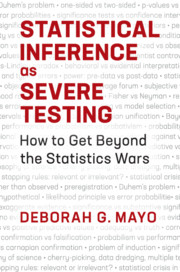Crossref Citations
This Book has been
cited by the following publications. This list is generated based on data provided by Crossref.
Kenett, Ron S.
and
Rubinstein, Abraham
2017.
A Generalization Approach to Reproducibility Claims.
SSRN Electronic Journal ,
Perezgonzalez, Jose D.
2018.
Three more steps toward better science.
F1000Research,
Vol. 7,
Issue. ,
p.
1728.
Dyckman, Thomas R.
and
Zeff, Stephen A.
2018.
Statistical Testing: A Commentary on Research Integrity and Protocol.
SSRN Electronic Journal ,
Lakens, Daniel
Adolfi, Federico G.
Albers, Casper J.
Anvari, Farid
Apps, Matthew A. J.
Argamon, Shlomo E.
Baguley, Thom
Becker, Raymond B.
Benning, Stephen D.
Bradford, Daniel E.
Buchanan, Erin M.
Caldwell, Aaron R.
Van Calster, Ben
Carlsson, Rickard
Chen, Sau-Chin
Chung, Bryan
Colling, Lincoln J.
Collins, Gary S.
Crook, Zander
Cross, Emily S.
Daniels, Sameera
Danielsson, Henrik
DeBruine, Lisa
Dunleavy, Daniel J.
Earp, Brian D.
Feist, Michele I.
Ferrell, Jason D.
Field, James G.
Fox, Nicholas W.
Friesen, Amanda
Gomes, Caio
Gonzalez-Marquez, Monica
Grange, James A.
Grieve, Andrew P.
Guggenberger, Robert
Grist, James
van Harmelen, Anne-Laura
Hasselman, Fred
Hochard, Kevin D.
Hoffarth, Mark R.
Holmes, Nicholas P.
Ingre, Michael
Isager, Peder M.
Isotalus, Hanna K.
Johansson, Christer
Juszczyk, Konrad
Kenny, David A.
Khalil, Ahmed A.
Konat, Barbara
Lao, Junpeng
Larsen, Erik Gahner
Lodder, Gerine M. A.
Lukavský, Jiří
Madan, Christopher R.
Manheim, David
Martin, Stephen R.
Martin, Andrea E.
Mayo, Deborah G.
McCarthy, Randy J.
McConway, Kevin
McFarland, Colin
Nio, Amanda Q. X.
Nilsonne, Gustav
de Oliveira, Cilene Lino
de Xivry, Jean-Jacques Orban
Parsons, Sam
Pfuhl, Gerit
Quinn, Kimberly A.
Sakon, John J.
Saribay, S. Adil
Schneider, Iris K.
Selvaraju, Manojkumar
Sjoerds, Zsuzsika
Smith, Samuel G.
Smits, Tim
Spies, Jeffrey R.
Sreekumar, Vishnu
Steltenpohl, Crystal N.
Stenhouse, Neil
Świątkowski, Wojciech
Vadillo, Miguel A.
Van Assen, Marcel A. L. M.
Williams, Matt N.
Williams, Samantha E.
Williams, Donald R.
Yarkoni, Tal
Ziano, Ignazio
and
Zwaan, Rolf A.
2018.
Justify your alpha.
Nature Human Behaviour,
Vol. 2,
Issue. 3,
p.
168.
Heino, Matti T. J.
Vuorre, Matti
and
Hankonen, Nelli
2018.
Bayesian evaluation of behavior change interventions: a brief introduction and a practical example.
Health Psychology and Behavioral Medicine,
Vol. 6,
Issue. 1,
p.
49.
Llewelyn, Huw
and
Speier, William
2019.
Replacing P-values with frequentist posterior probabilities of replication—When possible parameter values must have uniform marginal prior probabilities.
PLOS ONE,
Vol. 14,
Issue. 2,
p.
e0212302.
Perezgonzalez, Jose D.
2019.
Three more steps toward better science.
F1000Research,
Vol. 7,
Issue. ,
p.
1728.
Brittan, Gordon
and
Bandyopadhyay, Prasanta Sankar
2019.
Ecology, Evidence, and Objectivity: In Search of a Bias-Free Methodology.
Frontiers in Ecology and Evolution,
Vol. 7,
Issue. ,
Caldwell, Aaron R.
and
Cheuvront, Samuel N.
2019.
Basic statistical considerations for physiology: The journalTemperaturetoolbox.
Temperature,
Vol. 6,
Issue. 3,
p.
181.
Dennis, Brian
Ponciano, José Miguel
Taper, Mark L.
and
Lele, Subhash R.
2019.
Errors in Statistical Inference Under Model Misspecification: Evidence, Hypothesis Testing, and AIC.
Frontiers in Ecology and Evolution,
Vol. 7,
Issue. ,
Spanos, Aris
2019.
What Foundations for Statistical Modeling and Inference?.
OEconomia,
p.
833.
Wasserstein, Ronald L.
Schirm, Allen L.
and
Lazar, Nicole A.
2019.
Moving to a World Beyond “
p
< 0.05”
.
The American Statistician,
Vol. 73,
Issue. sup1,
p.
1.
Bailey, Charles D.
2019.
Unethical Practices by Accounting Researchers: Incidence, Intentions, and Insights.
SSRN Electronic Journal,
Dienes, Zoltan
2019.
How Do I Know What My Theory Predicts?.
Advances in Methods and Practices in Psychological Science,
Vol. 2,
Issue. 4,
p.
364.
Loenneke, Jeremy P.
Buckner, Samuel L.
Dankel, Scott J.
and
Abe, Takashi
2019.
Exercise-Induced Changes in Muscle Size do not Contribute to Exercise-Induced Changes in Muscle Strength.
Sports Medicine,
Vol. 49,
Issue. 7,
p.
987.
Romero, Felipe
2019.
Philosophy of science and the replicability crisis.
Philosophy Compass,
Vol. 14,
Issue. 11,
Mayo, Deborah G.
2019.
P‐value thresholds: Forfeit at your peril.
European Journal of Clinical Investigation,
Vol. 49,
Issue. 10,
Handayani, Oktia Woro Kasmini
Wiranti, Iin
Raharjo, Bambang Budi
and
Nugroho, Efa
2019.
The Reproduction Health Behavior of High School Teenagers in Semarang, Indonesia.
The Open Public Health Journal,
Vol. 12,
Issue. 1,
p.
309.
Perezgonzalez, Jose D.
Pascual-Soler, Marcos
Pascual-Llobell, Juan
and
Frias-Navarro, Dolores
2019.
Book Review: Statistical Inference as Severe Testing.
Frontiers in Psychology,
Vol. 10,
Issue. ,
Gonçalves-Souza, Thiago
Garey, Michel V.
da Silva, Fernando R.
Albuquerque, Ulysses Paulino
and
Provete, Diogo B.
2019.
Methods and Techniques in Ethnobiology and Ethnoecology.
p.
87.



